The museum is not enough. Fadil Muqolli wakes up every day with the internal struggle to seek justice for the family members who were killed by Serbian forces in the 1998/1999 war. The blood is shed, but justice is still elusive.
Fadil Muqolli, 55, has eyes full of pain, longing and anticipation. Muqolli held back tears as he spoke with BIRN about his discovery, 25 years ago, of the burnt corpses of family members, including his mother, father, children, wife, and siblings, who had been killed and burned in the massacre of Poklek in Drenas.
“I have not gotten out of this event in 25 years,” Muqolli told BIRN, reminiscing about his inability to “be the parent my children deserve”.
The 55-year-old doesn’t cry amongst others, keeping his sorrow private.. Muqolli visits his old home, the site of the massacre, every afternoon. Coming home from work, to a new house across the street from the old one, Muqolli’s head is full of painful war memories as he visits the family that no longer exists.
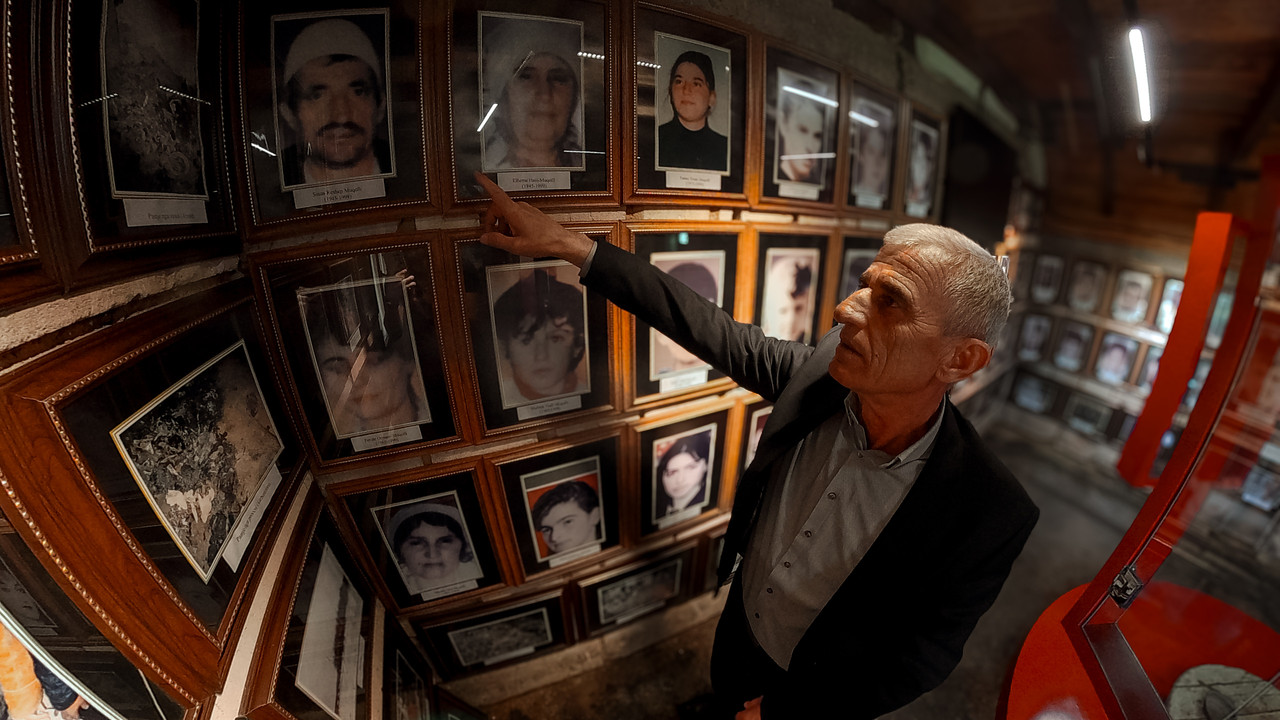
Fadil Muqolli, relative of Poklek massacre victims. Photo:Denis Sllovinja/BIRN
“When I went for the bones, as I didn’t want to let Serbs take them away, there was a smell on my hands while picking them up that still feels like I can smell it on my hands, the smell of burnt bones,” Muqolli recounts as he looks at the photos hanging on the walls of the house.
Muqolli has preserved his former home for 25 years, caring alone for the photographs, clothes, and belongings of his loved ones killed by Serbian paramilitary and military forces on April 17, 1999.
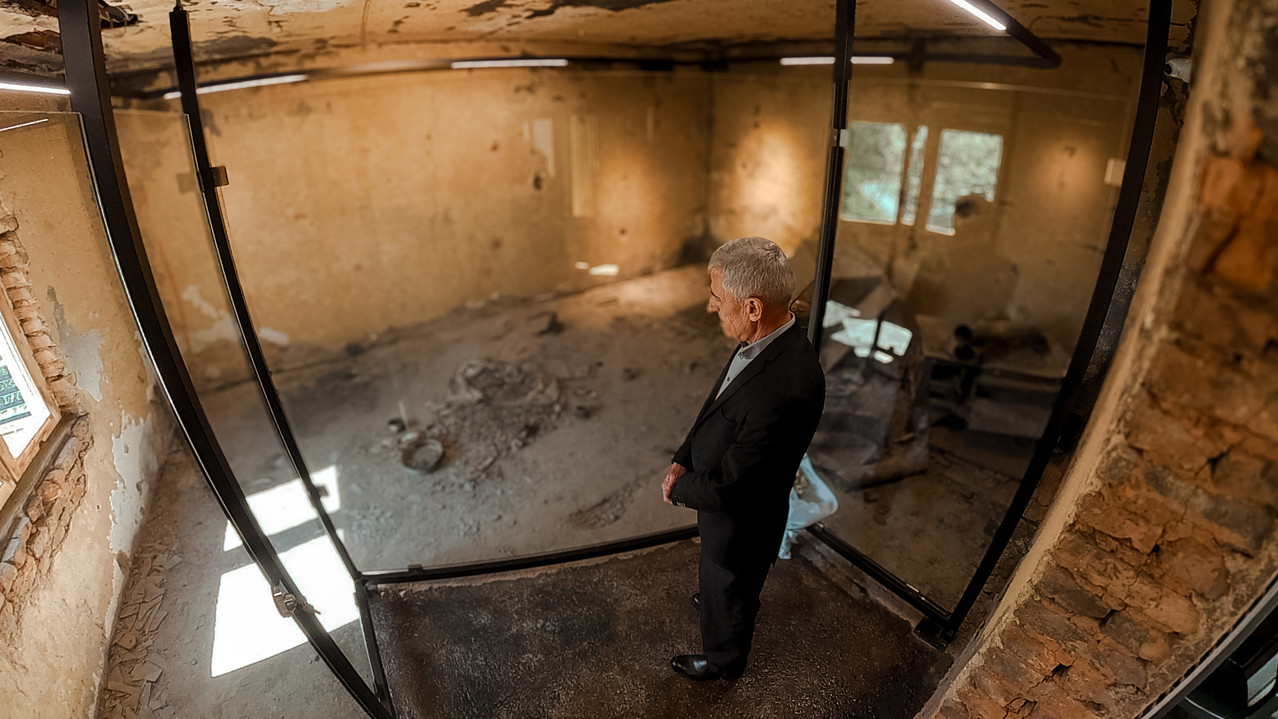
Fadil Muqolli, relative of Poklek massacre victims. Photo:Denis Sllovinja/BIRN
“I remember everything”
Muqolli, who lost 14 close relatives in the Poklek massacre, can remember even the smallest details fromApril 1999, from the river of blood in his house to the smell of his hands that buried 53 brutally murdered bodies inside the house, which, 25 years later, will become a museum.
“I remember everything, from the moment when I received news of what had happened, until the moment I saw it myself, the moment when I entered the basement and stepped on blood as if it were water, when I saw blood dripping from the ceiling, the moment when I started putting the bones of all those people in one place” Muqolli says.
Muqolli learned about the massacre from his uncle, a fellow soldier of the Kosovo Liberation Army, KLA. Muqolli was in the mountains on the day of the murders, fighting alongside other KLA soldiers. The news of the massacre was unbelievable to Muqolli, who refused to believe anyone until he saw the bones himself.
Muqolli vividly recalls the events of April 17, when Serbian forces attacked his village. The night before, he and his loved ones had enjoyed a meal together in the same room where the massacre would soon be committed. As they departed the next morning, they could not fathom the horrors that awaited them.
“I went to find my brother Qamil, he fought in the war too, and he had been in there and seen them. I found him and asked him ‘Do you know about this?’ and he said ‘Yes. I was there and I saw them. They killed them and they burned them.’ I asked ‘Everyone?’ and he said ‘Everyone,’ Muqolli recalls.
“Not a single family member of ours survived, everyone was murdered,” Muqolli recounted.
Six people survived the terrible events of April 17, and Muqolli listened to their stories of the horrible event. Based on their recollections, Muqolli now refers to the events of that day as ‘the Holocaust of Kosovo’. Retelling the survivors’ accounts, Muqolli tells of how Serbian forces entered the house, took the people out, counted them, and put them back inside, never to come out alive again.
The only ones taken out to be executed were Muqolli’s father and brother – whose bodies were later found in the house’s well.
“Right after that they (Serbs) came to the house, opened the door, and threw two hand grenades in. Once it got quiet after the grenades, they went in with automatic rifles and started shooting until they thought they killed everyone, and then left the house,” recounted Muqolli.
Among the dead were 23 children, the youngest being a six-month-old baby.
Inside that room, seven members of the Halil Muqolli family were killed, along with six members of the Rrahman Muqolli family, six members of the Ilmi Muqolli family, seven members of the Ramadan Muqolli family, seven members of the Ymer Elshani family, four members of the Caraku family, one member of the Hoxha family, and one member of the Tafil Muqolli family.
According to Muqolli, there were about 10 KLA soldiers who were related to those who were killed in Poklek. The soldiers were not present for the massacre because they, like Muqolli, were fighting at the time. Upon learning of the mass killing, the soldiers returned home to retrieve the bodies of their relatives, a very risky mission since Serbian soldiers remained positioned outside of Muqolli’s old home.
“We went in, took a car battery with us, a car headlight and a blanket and went inside, knowing the Serb forces were positioned in the houses of my uncles, and so we covered the window with the blanket so the light wouldn’t be seen. We turned the light on using the car battery and started collecting the bones,” Muqolli explained.
The memorial for the Poklek massacre, listing the names of each victim, can be found in the village square. A ceremony near the monument was also held to mark the massacre of Poklek.
Near the monument, at a high point of the Poklek village, there are only three graves among the yellow flowers. In the middle grave, all the bones of the 51 victims are buried. The bodies of Fadil Muqolli’s father and brother, found in the house’s well, each have their own grave.
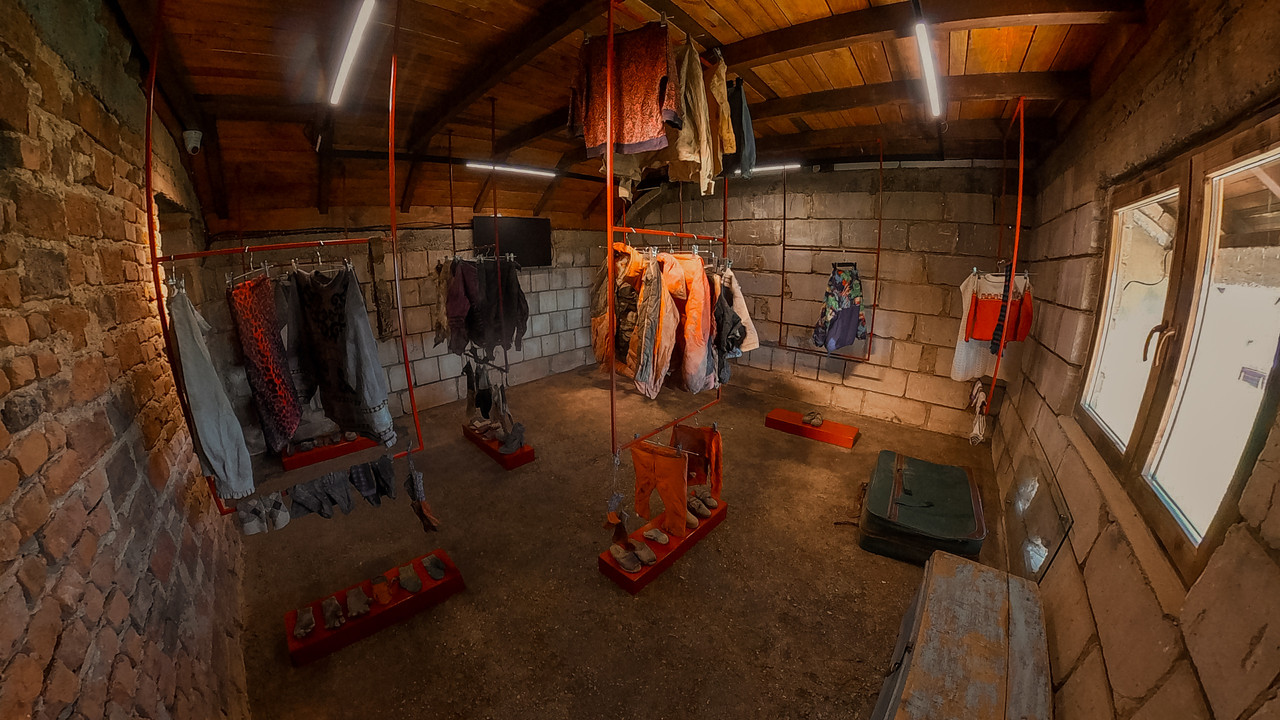
Photo: Denis Sllovinja/ BIRN
The war that never stopped
Years have passed, but the pain has not faded. Fadil Muqolli has a new wife, and they have two sons, but his anxiety and feelings of being burdened persists.
The house, which Muqolli had taken care of entirely on his own for 25 years, is now turning into a museum where photographs, clothes, books, notebooks, and other belongings of the deceased family members are kept. His connection to the house has made it impossible for the 55-year-old to ever escape from this event, even though it has caused him so much strife and suffering.
Muqolli struggled with his sense of self and his purpose in life after the events of April 17 and the war, but he chose to continue living because of his old house and the people in his life who were still alive.
“When the war was over, I went back to that room and I don’t know how long I stayed, but I was not myself while in it,” said Muqolli.
“I went outside, I sat on the small stairs and started thinking what and how; what was to happen with me; I had nothing; my entire family had been killed. My younger brother came, he was fourteen and a half. He saw I was not feeling ok and said to me “Bubba, do you know they killed my father and mother”, and I said “Yes”. He said “But, do you know that you are both my father and mother?,” added Muqolli.
Muqolli hopes that, once the museum is opened, a guide will also be appointed to lead tours. Currently, he retells the story of the massacre two or three times a week, explaining what happened to those visiting his old home and to the media. Although the 55-year old has never refused to tell anyone about what happened on April 17, 1999, he is ready to hand off the duties of explaining to younger people.
Inside the house, three and a half floors are filled with traced lines symbolizing blood on the ground, tables, photos of each victim, illustrations depicting their struggle within the house, burnt clothes, half-filled notebooks, and many other memories that Fadil Muqolli himself has preserved.
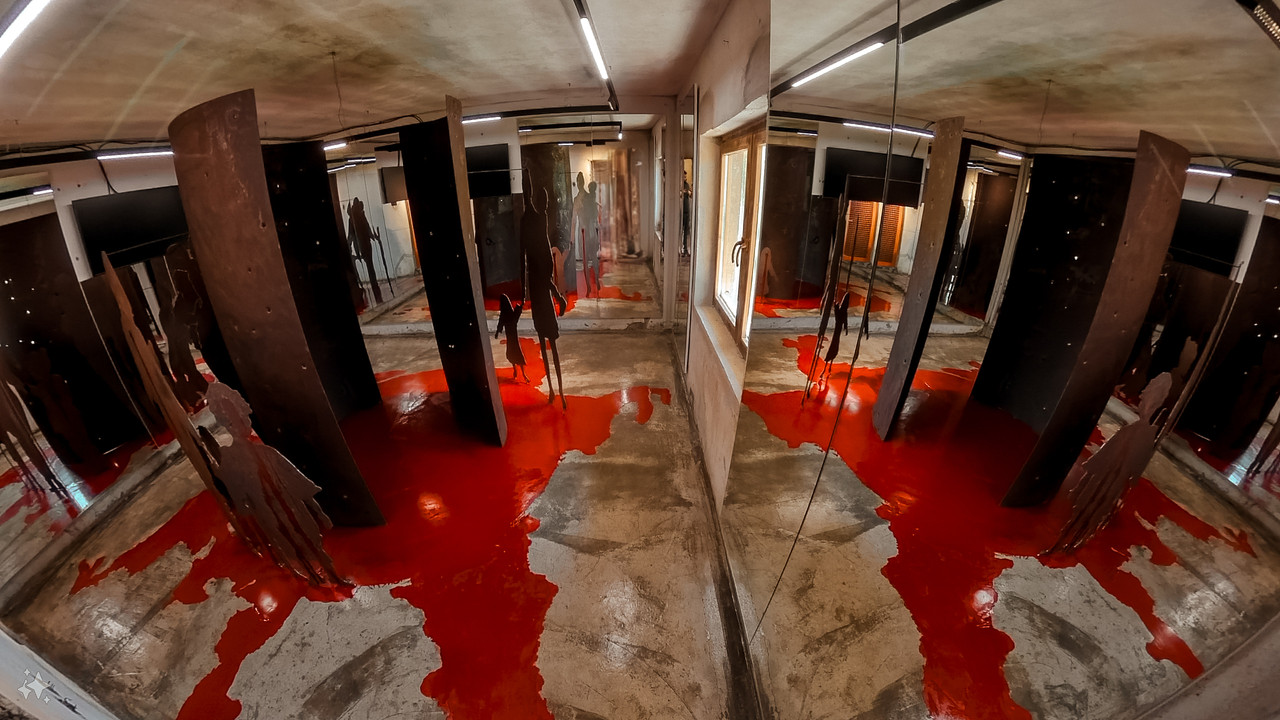
The Poklek massacre museum-house. The red color is displayed as a symbol of blood. Photo by Denis Sllovinja/BIRN.
Even though he lives with these memories, he feels sorry that he cannot remove the event from his mind, so much so that he feels bad about not being able to be a parent as he should for his children.
Muqolli says that when he moves away from the event, or when he goes to work, he is calmer because he focuses on something else. But when he is at home, he cannot remove the event from his mind for a single second. Because of this, Muqolli experiences things like a decline in mood and a psychological burden so overwhelming that he cannot meet anyone even for a coffee.
“But something I understood was that people never lose their mind from mental stress. Rather, people lose their mind from happiness. People don’t lose their mind from difficult experiences,” believes Muqolli.
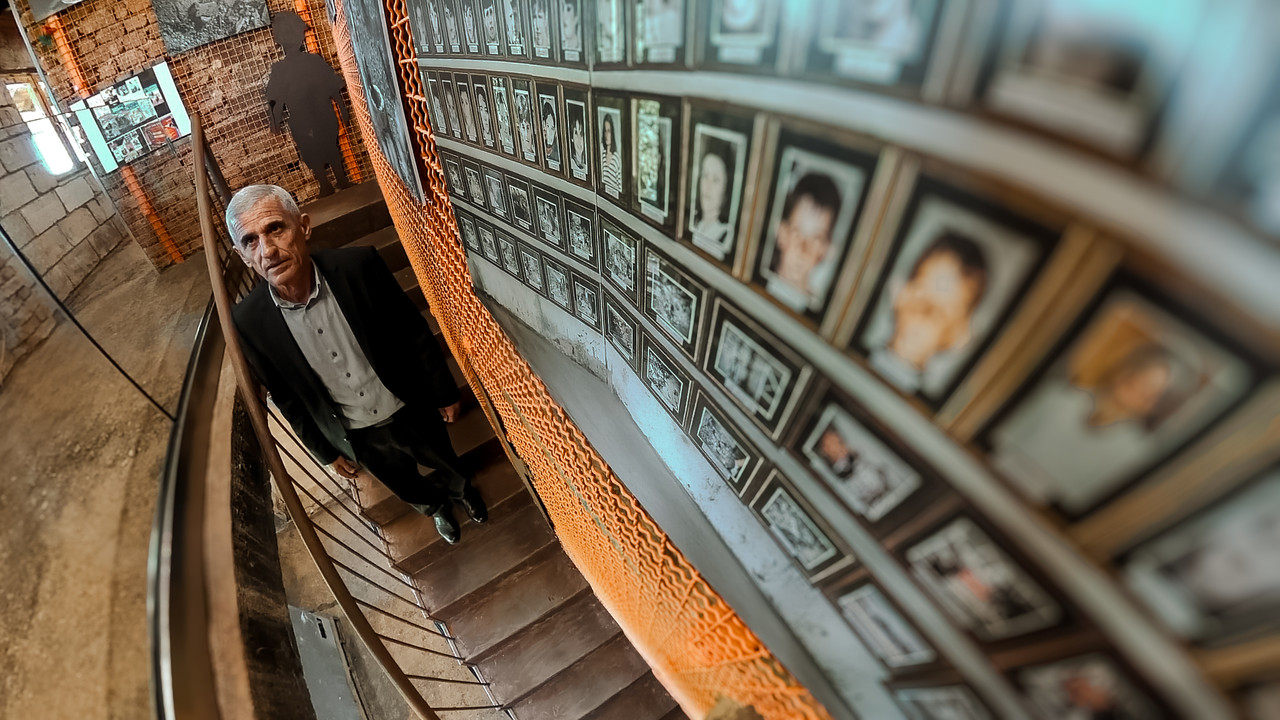
Fadil Muqolli, relative of Poklek massacre victims. Photo:Denis Sllovinja/BIRN
The blood that flows awaits justice
The identification documents belonging to the young people who were brutally murdered in Fadil Muqolli’s old house have disappeared. The only thing that has been done for this massacre, since further commemoration of the victims is difficult, is the transformation of the house into a museum.
Muqolli is plagued by the lack of justice. Since the identification documents do not exist, there have also been no war crimes convictions for the events which took place in Poklek. The massacre has not even been delegated to The Hague Tribunal for consideration. The museum may ease the pain of Muqolli’s psychic wounds a little. When work on the final museum project was finished, he turned on the lights and went outside to see how it looked.
“My soul was telling me to go inside the house as I will find them inside, but I knew I wouldn’t. It was a terrible feeling,” Muqolli recalled as he spoke about the Poklek house-museum, which he says has not been visited by any official of local or international justice.
Muqolli is greatly burdened by the fact that no one is interested in seeking justice for the Poklek massacre, to the extent that he doubts whether the judicial authorities are even working to uncover the facts of the case.
Although the Serbs committed the crime in Poklek, Muqolli considers the European Union Rule of Law Mission in Kosovo,EULEX, and the United Nations Mission in Kosovo, UNMIK, as accomplices, claiming they have hidden this crime and have not delegated it to The Hague.
“I don’t know why it happened to us as a family, but the word ‘justice’ seems absurd to us. For me, there is simply no justice. And for many people, and for all the country’s institutions, it is very painful to say, but they had absolutely zero interest,” he said, adding that the judicial officials must be in a coma,because otherwise the absence of justice in a place where blood is still dripping after 25 years is inhumane..
However, Muqolli won’t remain silent. He says he will not keep quite, and will use all formats to continue speaking about what happened to his family because if he doesn’t, “I don’t know why I’m living.”
According to him, there are still people who don’t know what happened in Poklek, and the whole event might seem like a dream to them since it’s not documented anywhere due to the institutions’ failure to prove such a gruesome massacre occurred. Muqolli says even historians from the Kosovo Academy of Sciences have not shown any interest in the Poklek massacre for the past 25 years.
“I would turn to them, saying “Do you have children? Do you have families?” Well, these are my family members, fourteen of them. Let’s replace my family members’ photos with those of your own ones and put yourself in my shoes for just two minutes. I would demand they give an answer after putting themselves in my shoes,” Muqolli said.
When work on the museum was completed, Muqolli told his friend to say “congrats”” even though it might seem incomprehensible to many people, For Muqolli, who has taken care of the house alone for 25 years, the completion of work on the museum is a massive accomplishment. , Despite all of the work that has been done on the house, blood from April 17, 1999, still stains the basement’s ceiling.
“I am convinced that the blood awaits someone. It awaits justice. The blood will not go dry. It will not go dry unless there is justice,” Muqolli said.
“Unfortunately, there seems to be no one the blood can wait for,” he hopelessly concludes.





